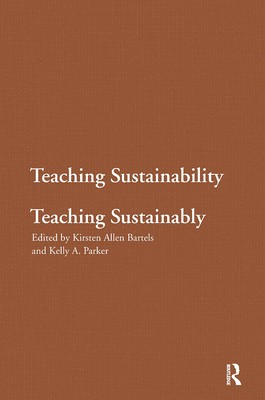
- We will send in 10–14 business days.
- Publisher: Stylus Publishing (VA)
- ISBN-10: 1579227384
- ISBN-13: 9781579227388
- Format: 15.2 x 22.9 x 2.3 cm, hardcover
- Language: English
- SAVE -10% with code: EXTRA
Teaching Sustainability / Teaching Sustainably (e-book) (used book) | bookbook.eu
Reviews
Description
Over the coming decades, every academic discipline will have to respond to the paradigm of more sustainable life practices because students will be living in a world challenged by competition for resources and climate change, and will demand that every academic discipline demonstrate substantial and corresponding relevance.
This book takes as its point of departure that integrating a component of sustainability into a discipline-specific course arises from an educator asking a simple question: in the coming decades, as humanity faces unprecedented challenges, what can my discipline or area of research contribute toward a better understanding of these issues? The discipline need not be future-oriented: an archaeologist, for instance, could incorporate into a course some aspects of sustainable archaeological practices in areas threatened by rapid climate change, as well as examples of sustainable or unsustainable ways of living practiced by members of the long-gone society under investigation.
This book also argues that courses about sustainability need to cross disciplinary boundaries, both because of the inter-relatedness of the issues, and because students will require the ability to use interdisciplinary approaches to thrive through the multiple careers most of them will face.
EXTRA 10 % discount with code: EXTRA
The promotion ends in 18d.02:46:03
The discount code is valid when purchasing from 10 €. Discounts do not stack.
- Publisher: Stylus Publishing (VA)
- ISBN-10: 1579227384
- ISBN-13: 9781579227388
- Format: 15.2 x 22.9 x 2.3 cm, hardcover
- Language: English English
Over the coming decades, every academic discipline will have to respond to the paradigm of more sustainable life practices because students will be living in a world challenged by competition for resources and climate change, and will demand that every academic discipline demonstrate substantial and corresponding relevance.
This book takes as its point of departure that integrating a component of sustainability into a discipline-specific course arises from an educator asking a simple question: in the coming decades, as humanity faces unprecedented challenges, what can my discipline or area of research contribute toward a better understanding of these issues? The discipline need not be future-oriented: an archaeologist, for instance, could incorporate into a course some aspects of sustainable archaeological practices in areas threatened by rapid climate change, as well as examples of sustainable or unsustainable ways of living practiced by members of the long-gone society under investigation.
This book also argues that courses about sustainability need to cross disciplinary boundaries, both because of the inter-relatedness of the issues, and because students will require the ability to use interdisciplinary approaches to thrive through the multiple careers most of them will face.


Reviews